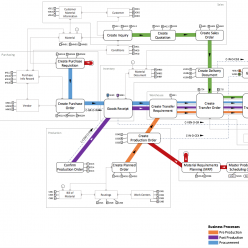
ERP system is a very popular solution for enterprise to adapt nowadays. Study conducted by IQMS had shown that many companies reported that data unification is one of the best advantages of implementing ERP system. After a company had implemented ERP system, different functional departments within the company are able to share data in real time and collaborate throughout the company. Thought data is shared across functional silos, ERP system has strict control over who can see and edit data. Each functional department has its own view; for instance, the purchase department would have the purchase department view, a purchase agent will not be able to see data that is not related to his or her work. ERP system enables the view solution to ensure the security of company data. Other benefits that enterprises have reported about ERP system are operation cost reduction, improved reporting and planning, and improved efficiency.

LG is a global scaled electronics corporation with 114 subsidiaries, more that 82,000 employees across 40 countries. LG found that the company has high maintenance cost, low transparency, and inefficient decision making for its HR functions. This has become a growing issue for LG to operate as a global enterprise and LG has decided to implement ERP system to solve this issue. The first challenge that LG had ran into was to choose the most suitable solution among the hundreds of ERP solution providers. LG had finally chosen to partner with Oracle to implement the ERP solution since LG has been partnering with Oracle for other projects. After successful implementation, LG HR is now able to manage a single system centrally with minimal maintenance costs. LG can also add transparency in the recruitment process across 40 countries and report to higher management in real time. However, LG ran into the second and most important challenge which was training employees to adapt to the new ERP system. This is also a very common challenge that many companies have faced after ERP implementation. Companies would usually provide extensive training program for employees to adapt to the new ERP program; also, support from the management level will also enhance the adaptation process.
Sources:
https://www3.technologyevaluation.com/research/article/the-5-biggest-challenges-when-implementing-erp-for-the-first-time.html
http://www.investopedia.com/articles/investing/111214/lg-case-study-successful-enterprise-resource-planning-system.asp
http://www.workwisellc.com/15-benefits-implementing-erp-software/
https://www.iqms.com/erp-success/
Benefits of ERP: Advantages and Disadvantages of an Enterprise Resource Planning System
https://selecthub.com/enterprise-resource-planning/benefits-of-erp-systems/


